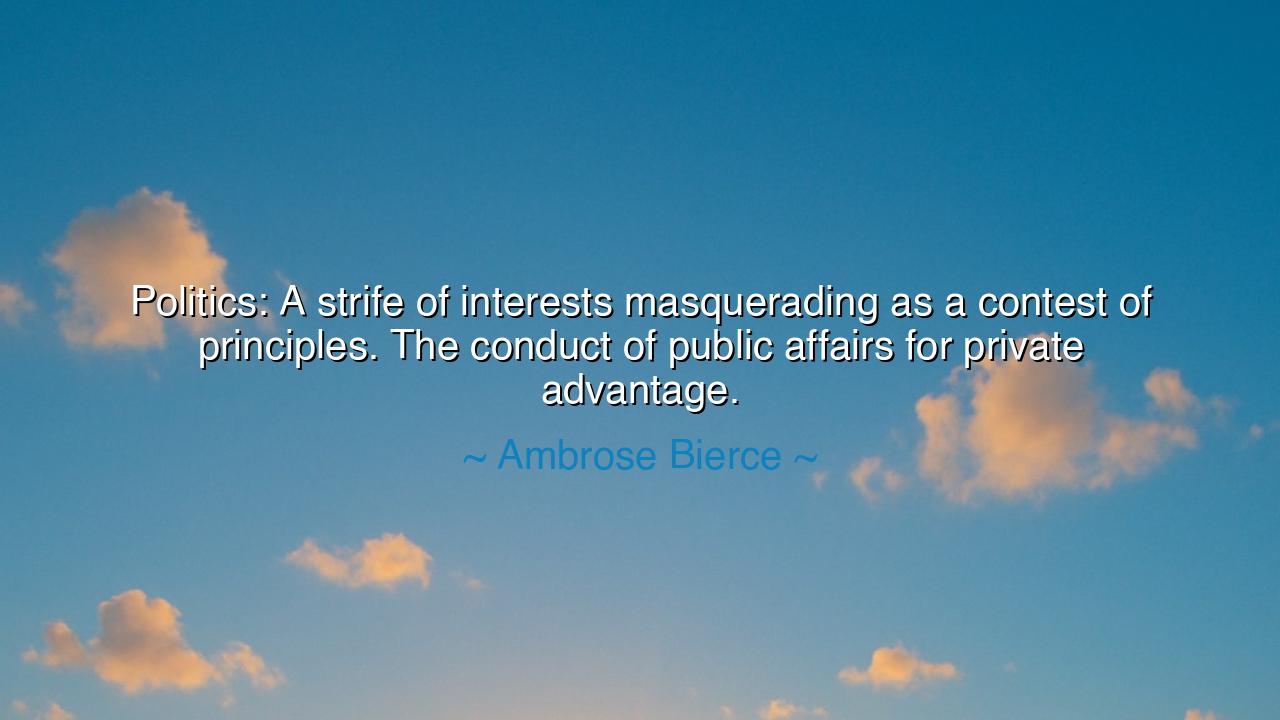
Politics: A strife of interests masquerading as a contest of
Politics: A strife of interests masquerading as a contest of principles. The conduct of public affairs for private advantage.






The words of Ambrose Bierce, “Politics: A strife of interests masquerading as a contest of principles. The conduct of public affairs for private advantage,” cut like a blade through the illusions of government. They unveil the truth that what is often paraded as noble service to the people may, in fact, be but a cloak for selfish gain. Behind the banners of freedom, justice, and progress, lie interests—of wealth, of power, of ambition—clashing in endless struggle, while the common man is told that it is all for lofty principles.
In the ancient spirit, this is the eternal warning that appearances deceive. Rulers and factions seldom admit they fight for gold, land, or influence; instead, they speak of divine right, patriotism, or the good of the people. Thus, politics becomes a theater where lofty words mask base desires. Bierce, with the sharpness of the cynic, tore aside the curtain to reveal the actors as they truly are: seekers of advantage, using the public stage for private ends.
Consider the tale of the Trojan War, sung by Homer. The poets tell us it was fought for the honor of Helen, the most beautiful woman in the world. But beneath the poetry lay the true cause: interests in trade routes, wealth, and power. The Greeks did not lay siege to Troy for ten long years merely for beauty’s sake. Rather, they cloaked ambition in the language of honor, turning naked desire into a noble-sounding principle. Here we see Bierce’s words come to life: a strife of interests, masquerading as a contest of principles.
History offers another mirror in the age of colonial empires. Nations proclaimed their mission to civilize and enlighten foreign lands, yet their true purpose was conquest, resource, and domination. The principle of spreading progress was the mask; the advantage of gold, land, and control was the reality. Thus, the conduct of public affairs—the grand speeches of parliaments and kings—was but the orchestration of private greed on a global scale.
So let this wisdom endure: do not be deceived by fine words and noble slogans. In every age, politics is the battleground of interests, and the wise citizen must learn to discern the difference between principle sincerely held and principle cynically used. Bierce’s words are both dagger and torch: a dagger to pierce falsehood, and a torch to light the truth. For only when the people see through the masquerade can public affairs be turned from private advantage to the service of the common good.






PLNo po lot
Bierce’s view of politics challenges us to question the motivations behind political actions. If political decisions are more about advancing personal interests than upholding principles, what does that mean for democracy? Are we as citizens complicit in this system, or can we demand a more principled approach to governance? What would it take to make politics truly about serving the public rather than individual benefit?
Hhau_542
Ambrose Bierce’s quote casts a harsh light on the nature of politics, suggesting it’s driven by personal gain masquerading as noble ideals. Is this an accurate view of modern politics, or is there still room for integrity in the political process? Can politicians balance self-interest with genuine public service, or are we doomed to a system driven by power struggles and competition?
TLDuong Ngoc Tue Linh
This quote from Bierce raises an uncomfortable truth about politics: it can often seem more about personal gain than public service. Is this always the case, or are there genuine leaders who are committed to serving the public interest? How do we reconcile the idea of politicians being self-serving with the possibility that some are truly working for the collective good of society?
HANguyen Hieu Anh
Bierce’s perspective on politics is jaded but not without merit. Politics often does seem like a contest between competing interests, where ideals take a back seat to private agendas. But how does this affect the average person? Does this mean that the general public is constantly being manipulated by those in power, or can politics still serve the greater good despite these inherent flaws?
TPThao Phuong
Bierce’s quote paints a cynical picture of politics, suggesting that it’s less about principles and more about self-interest. Is this how we should view politics in general, or is it an oversimplification? While it’s easy to become disillusioned with the state of political affairs, are there still instances where genuine principles guide decisions, or has self-interest truly taken over?